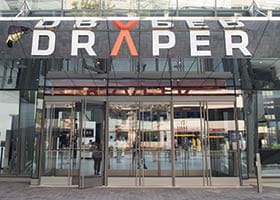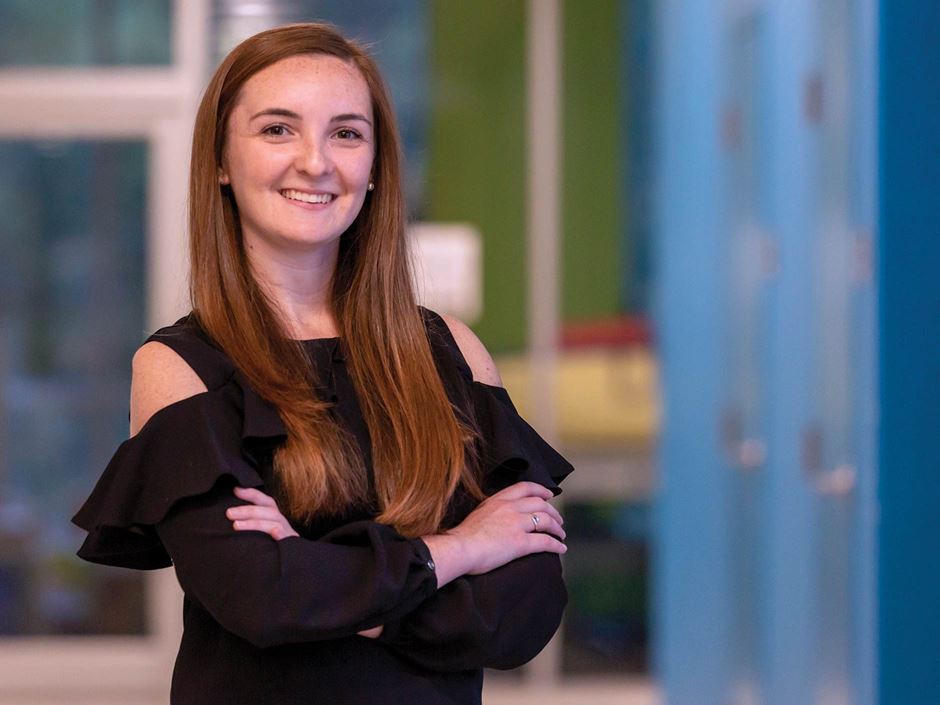In order to be at the forefront of experiential learning and remain true to Endicott's founding principle of integrating experience with academics, the Internship & Career Center introduced a co-op model to students in all majors. Because co-ops tend to be longer than internships, students can get more in-depth experience and become more integrated into a company’s work and culture.
When deciding to pursue an internship or co-op during her senior year, dual finance and business management major, Jamie Espinola ’19, chose to seek out the latter to have the ability to spend more time learning the inner-workings of the company.
Espinola says that her July-December co-op with Draper, in Cambridge, Mass., allowed her to gain hands-on experience. “My supervisors got to know me very well and, therefore, trusted me with certain responsibilities that they wouldn’t have with an intern who was just there for three months.”
“I learned that Draper created the navigation system that helped land us on the moon 50 years ago.”
Jamie Espinola '19
As a result of being with the company for six months, Espinola says that she obtained a keen understanding of who the company is and the type of work it does. “Draper is a big organization that contributes to various industries of technology, including national security and space exploration. In fact, while I was there, I learned that Draper created the navigation system that helped land us on the moon 50 years ago. Although I didn’t work on engineering projects directly, it was cool to know that something I purchased might help a department create something that could change the world.”
 Draper, located in Cambridge, Mass., engineers
Draper, located in Cambridge, Mass., engineers
solutions to problems of national security, space
exploration, health care, and energy.
Photo credit: Draper
While at Draper, Espinola worked in the procurement department where she was responsible for filling out purchase orders and working closely with vendors to get price quotes. Other responsibilities included assisting with an audit of Draper’s purchasing system and managing the process of its biochemical initiative, which is how the company purchases chemicals needed in the labs.
Espinola says that her co-op experience allowed her to hone her career plans. She recently accepted a position as a financial adviser at McAdam Financial in Boston but has hopes to own her own firm one day, where she can help people meet their financial goals.
“While I loved my time at Draper, I learned that procurement wasn’t the career for me. Because of my co-op, I learned things about myself, such as that I wanted to work for a larger company and didn’t want to sit behind a computer all day.”
 We spoke with Dean of the Internship & Career Center, Dale McLennan, to learn more about Endicott’s co-op program available to students in all majors. Here’s what she had to say.
We spoke with Dean of the Internship & Career Center, Dale McLennan, to learn more about Endicott’s co-op program available to students in all majors. Here’s what she had to say.
Can you provide an overview of the co-op program?
Co-ops and internships are both forms of experiential learning. Co-ops tend to be longer than internships (six months is the typical timeframe for a co-op, but they can be shorter or longer, too). Whether the experience is called a co-op or an internship is determined by the employer. Including co-ops under the umbrella of our internship model is important to keep our program at the forefront of experiential learning and ensure our students have access to the best opportunities available.
How is the co-op model beneficial to the overall internship program?
We have been developing relationships over the past few years with employers who have co-op opportunities, so we wanted to put a structure in place to open up this option to students. Co-ops are common in STEM fields, and as our STEM majors have grown in recent years, it was critical to offer these opportunities for our students. Adding co-ops to our model is also beneficial because it has opened the door to relationships with premiere employers like IBM, Raytheon, Wayfair, iRobot, Hasbro, Eaton Vance, New Balance, John Hancock, EF Education First, Fidelity, Liberty Mutual, and others.
Reasons students should take advantage of a co-op vs. internship?
Students may want to take advantage of co-ops for several reasons:
-
It is the standard for their field, such as engineering;
-
Co-ops tend to be longer than internships, so students can get more in-depth experience and become more integrated into the company’s work culture; and
-
Employers often use co-ops as a pipeline for hiring students into full-time jobs so they are a good resource for potential post-graduate employment.
